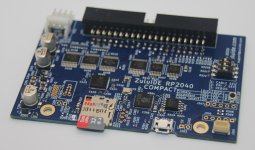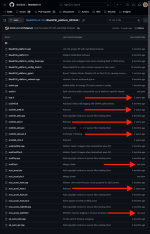aperezbios
Member
Rabbit Hole Computing, my company, has been working on such a thing quietly for the last year and a half. While it isn't 100% ready for prime time, it is available for those who wish to help improve the product. ZuluIDE is powered by an RP2040 microcontroller, in concert with a small Lattice iCE5 FPGA. ZuluIDE can currently emulate both ATAPI CD-ROMs (of arbitrary size, vastly larger than an original CD-ROM would allow for) as well as ATAPI removable Read-Write devices, such as Zip drive emulation, or generic ATAPI removable media, again, of arbitrary volume size. The maximum volume size is limited only by the machine you use it with. It's important to note that at the present time, ZuluIDE does not emulate rigid IDE hard drives.
For those of you familiar with ZuluSCSI, ZuluIDE Compact, the first entry in the ZuluIDE family, was designed to function in a similar manner, albeit with the ATA-imposed limitation of one device at a time. Future versions of ZuluIDE may support the ability to emulate both primary and secondary IDE devices at the same time, but that is currently NOT the case, for our first-generation hardware.
https://github.com/rabbitholecomputing/ZuluIDE-firmware and you can purchase one today at https://store.rabbitholecomputing.com/ZuluIDE.
The ZuluIDE firmware that runs on the RP2040 is open source, and anyone can build it from source, if they so desire. The FPGA which interfaces to the Parallel ATA bus and the RP2040 is closed source, and will likely remain this way indefinitely, in an effort to prevent clones. Rabbit Hole Computing has made a significant financial investment in this product, and we must now begin the process of recovering our initial cash investment. In the coming year, we expect to produce ZuluIDE in larger quantities, which will help us bring the manufacturing costs down, which I believe will in turn lead to a lower price point for ZuluIDE.
Currently, ZuluIDE supports PIO modes 0-3, as well as Ultra DMA 0. Real-world read speeds are around 7MB/second, which we expect to be able to improve significantly, via future firmware updates.
ZuluIDE has also been tested to work with FireWire to Parallel ATA, as well as inexpensive Serial ATA to Parallel ATA bridge products.
For those of you familiar with ZuluSCSI, ZuluIDE Compact, the first entry in the ZuluIDE family, was designed to function in a similar manner, albeit with the ATA-imposed limitation of one device at a time. Future versions of ZuluIDE may support the ability to emulate both primary and secondary IDE devices at the same time, but that is currently NOT the case, for our first-generation hardware.
https://github.com/rabbitholecomputing/ZuluIDE-firmware and you can purchase one today at https://store.rabbitholecomputing.com/ZuluIDE.
The ZuluIDE firmware that runs on the RP2040 is open source, and anyone can build it from source, if they so desire. The FPGA which interfaces to the Parallel ATA bus and the RP2040 is closed source, and will likely remain this way indefinitely, in an effort to prevent clones. Rabbit Hole Computing has made a significant financial investment in this product, and we must now begin the process of recovering our initial cash investment. In the coming year, we expect to produce ZuluIDE in larger quantities, which will help us bring the manufacturing costs down, which I believe will in turn lead to a lower price point for ZuluIDE.
Currently, ZuluIDE supports PIO modes 0-3, as well as Ultra DMA 0. Real-world read speeds are around 7MB/second, which we expect to be able to improve significantly, via future firmware updates.
ZuluIDE has also been tested to work with FireWire to Parallel ATA, as well as inexpensive Serial ATA to Parallel ATA bridge products.
Attachments
Last edited:



